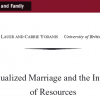What Happens When a Spendthrift Marries a Tightwad?
 Which adage is correct: “birds of a feather flock together” or “opposites attract”? Overwhelmingly in marriages we choose partners who are similar to us in a variety of characteristics – except for our money personalities. Many people are unhappy with their typical spending behaviors, and disliking a personal characteristic can be motivation for choosing a spouse with the opposite characteristic. People on extreme ends of the tightwad-spendthrift scale we covered two weeks ago might be particularly prone to marry someone on the opposite end of the scale – but how does that choice affect their marital harmony?
Which adage is correct: “birds of a feather flock together” or “opposites attract”? Overwhelmingly in marriages we choose partners who are similar to us in a variety of characteristics – except for our money personalities. Many people are unhappy with their typical spending behaviors, and disliking a personal characteristic can be motivation for choosing a spouse with the opposite characteristic. People on extreme ends of the tightwad-spendthrift scale we covered two weeks ago might be particularly prone to marry someone on the opposite end of the scale – but how does that choice affect their marital harmony?
Rick et al. conducted several short surveys of married individuals and married couples, in each case assessing the partners on the TW-ST scale and asking other questions regarding their marriages. Here are their results:
- spouses’ TW-ST scores are negatively correlated – people do tend to marry their money complement instead of someone similar to them
- level of distress over spending was positively correlated with the absolute value of the difference between the spouses’ TW-ST scores – since the causality is uncertain, this could either mean that people who experience spending distress tend to marry their complements or that marrying someone with a different money personality produces spending distress (the researchers prefer the former)
- larger differences between spouses’ TW-ST scores predicts decreased marital well-being and financial harmony, with the decrease in financial harmony fully explaining the decrease in marital well-being
- having higher TW-ST scores predicts worse financial outcomes like having credit card debt and not having $50,000 in savings (controlling for income), but decreased marital well-being persists even when controlling for financial outcomes
The most interesting finding of this study for me was the final bullet point, which the authors explain as “Spendthrifts who marry spendthrifts tend to experience greater relationship satisfaction, despite their worse financial outcomes. In contrast, tightwads may enjoy better financial outcomes and greater relationship satisfaction if married to another tightwad (p. 234).”
My first critique of this paper is in their participant selection – one study drew from online survey participants and two studies drew from surveys posted online. People with more money issues may self-select to participate in these studies and it would be more ideal to sneak some more money questions into one of the big national surveys on marriage.
My second critique is that the paper didn’t mention the “unconflicted” group in the TW-ST scale at all. Were most of the pairings they observed really tightwads with spendthrifts? What are the financial and marital outcomes for two “unconflicted”s?
If I were to turn this paper into advice (warning! danger!) I would say: 1) don’t be a spendthrift, 2) don’t marry a spendthrift, and 3) marry someone with a TW-ST score similar to your own (like I did!). No, I’m being a bit facetious. The study assessed marital well-being (important) and financial outcomes (important) but we all knew who was going to win those contests. But what advantage does a spendthrift confer to a relationship? Clearly all these tightwads find them desirable. I wonder how the positive effect of a spendthrift in a relationship could be assessed – overall stress levels? closer relationships with family and friends?
On a personal note:
1) One of my parents is a tightwad and the other is a spendthrift. They have lots of conflict over money and decreased marital well-being.
2) Even though Kyle and I have exactly the same TW-ST score, we still have conflict over money, though it’s about fairly minor differences in preferences or how obsessive/anal I’m being. I guess I’m saying that even if you’re not that different, if you have the personality for it (and I do) you’ll find things to fight over!
Do you have personal experiences or observations to support or detract from the study’s conclusions? What’s the difference between your spouse’s TW-ST score and yours? What does a spendthrift bring to a relationship with a tightwad?
Rick SI, Small DA, Finkel EJ. “Fatal (Fiscal) Attraction: Spendthrifts and Tightwads in Marriage.” Journal of Marketing Research 48: 228 –237.
photo from Free Digital Photos
Filed under: marriage, the literature · Tags: cheapskates, marriage, opposites attract, spendthrifts, tightwads

 Can You Change Your Tightwad/Spendthrift Personality?
Can You Change Your Tightwad/Spendthrift Personality? Are You a Tightwad, a Spendthrift, or Unconflicted?
Are You a Tightwad, a Spendthrift, or Unconflicted? Financial Disclosure Before and After Engagement
Financial Disclosure Before and After Engagement Joint and Separate Money Series: Individualized Marriage and Money Management
Joint and Separate Money Series: Individualized Marriage and Money Management


Interesting research. My partner and I actually tend to be very different in many regards but very similar in terms of financial philosophy. I agree with you advice not to be a spendthrift!!
Brian recently posted..I can haz vacation?
Well, you’re definitely bucking the norm there by being heterogeneous, but I was reading over the weekend about how it’s really personality that has the biggest influence on how well a couple gets along, and personality is much harder to ascertain than demographic factors both by people and studies. Did you find your commonality in financial philosophy as an attractive point early on?
I’ve become a tightwad and he’s more of a spendthrift. Not quite as bad as he (we) used to be but still, he doesn’t always think it’s an issue spending money. This actually works out well for us as I can go super focused and not want to spend any money at all (why do we need food? why do we need toilet paper) and he balances me out. He makes sure that we do spend some money and I make sure that we are saving and paying off debt and not just spending randomly.
bogofdebt recently posted..To move or not to move
It sounds like you are an example of pairing with your opposite because you dislike a trait in yourself (or at least realize it should be tempered). Do you have a lot of conflict around money?
Not often-we both know the goals we have in mind. Not saying there is zero conflict but as we now have a budget, a lot less fighting about it in general. Of course, I do get overzealous sometimes but so does he and we both recognize it.
bogofdebt recently posted..Pet Peeves Part 2
I’m the TW, she’s the ST. I think the attraction is that she is the one to let loose whereas I’m more reserved and controlled about my spending habits (among other habits). I’m on the side of the fence that says opposites attract. You need a good compliment in your life to even the relationship out.
My Money Design recently posted..Social Security Spousal Benefits – Hook Me Up Elderly Sugar Momma!
Do you think there is a higher evaluation of marital success than ‘well-being’? I suppose I agree that marrying a complement may be beneficial if you don’t like the personality characteristic in yourself, as this paper studied – not in increased marital well-being but perhaps financial outcomes. Depends on what you prioritize, I guess. Are you guys extremes or rather moderate TW and ST?
We’re opposites. I’m a spendthrift in some areas (specifically vacations and experiences) whereas he’d rather have physical items and doesn’t see the need to go on expensive vacations. And I don’t see the need to buy lots of things haha
Michelle recently posted..Fixed term or easy access for your savings, which is better?
Kyle and I have similar tendencies with objects vs. experiences, but I think we mostly agree on experiences.
Marriage often finds a way to work with these polar opposites as its participants.
I know that’s how it worked for my parents. My father was not necessarily a spend thrift but if he wanted something he wanted to go out and buy it.
He would often mention that if not for my mother, our family would have long since been residents of the Poor House.
Mom was the coupon clipper, the bargain hunter, the frugal shopper meticulously scanning every sales paper.
Thriftiness was so ingrained, in fact, that once she was able to afford the finer things in life–it was too late to relinquish her tight wad tendencies.
Adam D. Oglesby recently posted..It’s Dangerous To Cheat On Your Mistress!
It sounds like your mother’s personality dominated, which it seemed was beneficial for their financial outcome. It’s too bad she couldn’t let up a bit when they could afford to. I try to internalize messages like these so that I don’t succumb to the same fate.
My wife and I are both tightwads, so it works out well 🙂 I think if one of us was a spendthrift we would defintiley argue and have a tough time of it.
TB at BlueCollarWorkman recently posted..Teachers on Strike: Should They Get Paid More?
It’s very difficult to go against your nature, especially when your nature is not necessarily objectively wrong but only wrong in the eyes of your spouse – a lesson I’m continually learning in areas outside of our finances!
I sometimes wonder if there is a correlation between extroversion and spending. The spendthrifts I’ve known have all been rather extroverted. If the same trend held true for introversion and tightwads, then the benefit that a tightwad would see in a spendthrift wouldn’t be related to their financial habits directly, but in getting them to engage in the outside world more. My wife is definitely to my right on the TW-ST scale (although probably still in the “unconflicted” range) and almost all of the socializing I’ve done in the last year has been at events my wife has inflicted on me! 🙂
Edward Antrobus recently posted..Redefine Your Spending
I hadn’t really thought about that possible correlation – it holds for my parents but I don’t really know a lot of spendthrifts (at least that I know they are). It might depend on how the spendthrift prefers to spend – definitely if it’s social spending or hospitality there could be a connection.
I tend to believe that opposites do attract however I’ve noticed that it certainly brings marital conflict when you have a tightwad and a spendthrift; especially when nether of them are willing to compromise much.
I still very much the spender of the family while my wife is the saver but we have very few financial conflicts. I guess it would be because I’m not really a “spender” compared to the rest of society. I just make sure we buy some things and have a little bit of a life. 🙂
Jason @ WSL recently posted..Is it Necessary to Buy a House?
You’re probably “unconflicted” rather than a ST. And yes, I think good communication and the willingness to compromise can go a long way to resolving conflict in a way that enhances rather than damages the relationship!
[…] @ Evolving Personal Finance writes What Happens When a Spendthrift Marries a Tightwad? – I share the results of a paper concerning marital outcomes when spouses are on opposite […]
[…] @ Evolving Personal Finance writes What Happens When a Spendthrift Marries a Tightwad? – I share the results of a paper concerning marital outcomes when spouses are on opposite […]
[…] of Debt included What Happens When a Spendthrift Marries a Tightwad? in her link […]
[…] 3) What Happens When a Spendthrift Marries a Tightwad? […]
[…] What Happens When a Spendthrift Marries a Tightwad? by Evolving PF. […]
[…] the psychology and sociology literature and written posts explaining the authors’ findings (“What Happens When a Spendthrift Marries a Tightwad?”). I do a lot of math behind-the-scenes to help analyze PF questions and illustrate principles […]
[…] from Live Well on Less included What Happens When a Spendthrift Marries a Tightwad? in his post on couples and […]
[…] What Happens When a Spendthrift Marries a Tightwad? […]
[…] “fatal (fiscal) attraction: spendthrifts and tightwads in marriage citation” – Yeah, I totally wrote a post about that paper. […]
[…] student in North Carolina who blogs over at Evolving Personal Finance. She frequently writes about money in marriage, living well on a grad student stipend, and how to line up your budget with your values. Thanks for […]